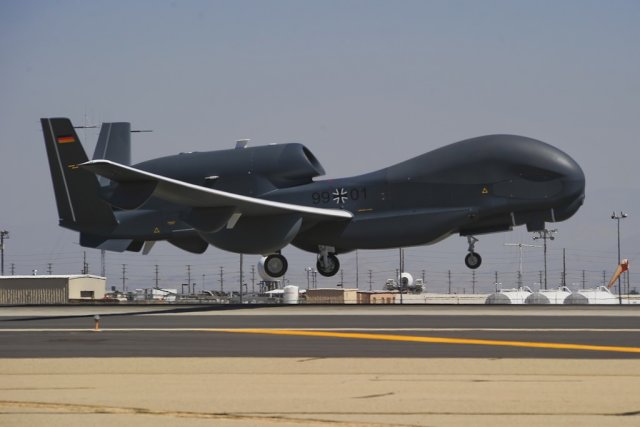Breaking news
Germany's Euro Hawk drone may take flight again.
| 2014
| a | |||
| |
|||
World
Aviation Defense & Security News - Germany |
|||
| Germany's Euro Hawk drone may take flight again | |||
German
Defense Minister Ursula von der Leyen is considering bringing the Euro
Hawk program online once again, the Sunday edition of the Frankfurter
Allgemeine Zeitung newspaper, the FAS, reported. The defense ministry
told the FAS it was necessary to "take the Euro Hawk drone out
of the garage again" in order to test its reconnaissance system
in high elevations of up to 20 kilometers (12.5 miles) and over a long
period of time.
|
|||
 German Euro Hawk is based on an older version of the US RQ-4 Global Hawk surveillance unmanned aerial vehicle |
|||
Former Defense Minister
Thomas De Maiziere canceled the costly Euro Hawk drone last year when
it became apparent the plane would not get flight clearance over Europe.
A parliamentary investigation later revealed that concerns over this
particular issue were put into writing by the air force as early as
1999. The need to test the drone's reconnaissance system follows a defense ministry report commissioned in February, which will be presented on Monday. According to FAS, the defense ministry has attempted to test the Euro Hawk's reconnaissance system on other platforms, including Airbus aircraft and an Israeli drone, but was unsuccessful. The reconnaissance system will allow Germany's military, the Bundeswehr, to detect, decrypt and interfere with potential enemy communications signals. Should further tests be successful, a carrier will be purchased, most likely similar to the US variant the Global Hawk, FAS reported. The Euro Hawk is based on an older version of the Global Hawk. The Euro Hawk program was plagued by cost overruns during its more than a decade of development. It was estimated to cost a further 500 to 600 million euros ($625 to $750 million) to complete when de Maiziere pulled the plug last year. From the time development began until it was canceled, the Euro Hawk had already cost taxpayers 600 million euros, of which 288 million went towards the reconnaissance system. |
|||



















